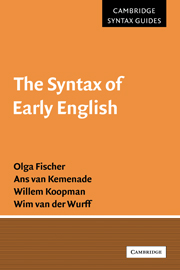Book contents
- Frontmatter
- Contents
- Preface
- List of editions used
- 1 Language change and grammar change
- 2 An outline of Old English syntax
- 3 An outline of Middle English syntax
- 4 The Verb-Second constraint and its loss
- 5 The loss of object–verb word order
- 6 Verb–particles in Old and Middle English
- 7 Changes in infinitival constructions
- 8 The history of the ‘easy-to-please’ construction
- 9 Grammaticalization and grammar change
- References
- Index
9 - Grammaticalization and grammar change
Published online by Cambridge University Press: 23 December 2009
- Frontmatter
- Contents
- Preface
- List of editions used
- 1 Language change and grammar change
- 2 An outline of Old English syntax
- 3 An outline of Middle English syntax
- 4 The Verb-Second constraint and its loss
- 5 The loss of object–verb word order
- 6 Verb–particles in Old and Middle English
- 7 Changes in infinitival constructions
- 8 The history of the ‘easy-to-please’ construction
- 9 Grammaticalization and grammar change
- References
- Index
Summary
Introduction
In this chapter we will discuss two cases of long-term change in the history of English which have been interpreted by a number of linguists as cases of grammaticalization. We will present an account of the historical development of the periphrastic construction with have to and of the development of sentential negation, better known as Jespersen's negative cycle. We will, in the spirit of this book, analyse these cases explicitly in terms of grammar change. We want to show what role the (synchronic state of the) grammar and the language acquisition process play in a development which grammaticalization theorists – looking at it from a language-historical rather than a grammar-theoretical angle – generally regard as a universal, gradual, long-term development with an impetus of its own. This is a view that, as such, is foreign to the general approach adopted in this book, and we shall therefore propose reanalyses of the two changes, suggesting that they can be understood using the notion of grammar change that we also employed in analysing the empirical developments dealt with in the earlier chapters.
Before explicating the differences between these two approaches, we should say that the term ‘grammaticalization’ itself is used in two different ways, which is potentially confusing. According to the most traditional use of the term, grammaticalization is an empirical phenomenon, for which Meillet's (1912: 13) definition is appropriate: it involves the ‘[a]ttribution du caractère grammatical à un mot jadis autonome’ (the attribution of grammatical character to an erstwhile autonomous word). Grammaticalization in this sense refers to the countless instances of language change whereby lexical elements lose their lexical status and come to be employed as grammatical function words.
Information
- Type
- Chapter
- Information
- The Syntax of Early English , pp. 284 - 321Publisher: Cambridge University PressPrint publication year: 2001
